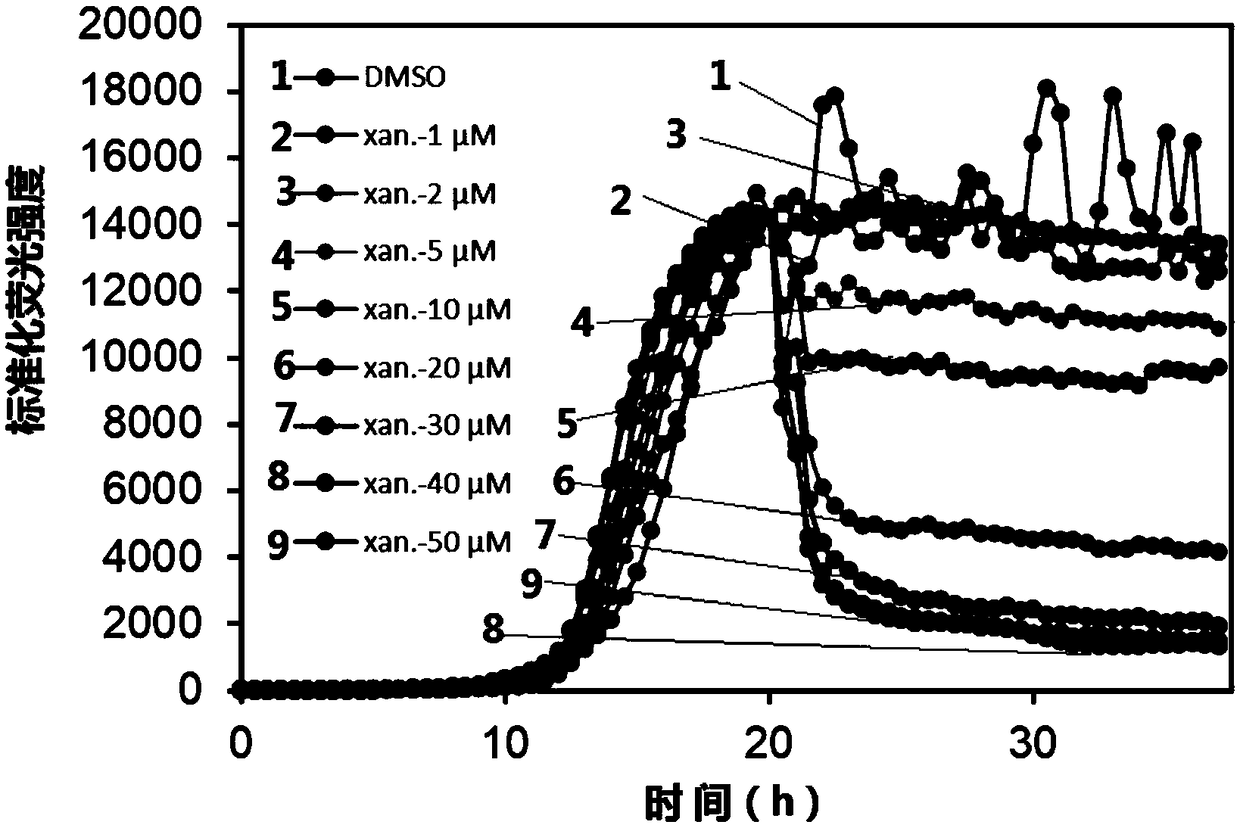Application of xanthohumol to inhibition of abnormal aggregation of Tau proteins
A technology of xanthohumol and protein, applied in the field of biomedicine, can solve the problems of unsatisfactory drug efficacy, achieve the effect of less toxic and side effects, good curative effect, and inhibit abnormal aggregation of Tau protein
- Summary
- Abstract
- Description
- Claims
- Application Information
AI Technical Summary
Problems solved by technology
Method used
Image
Examples
Embodiment 1
[0046] Example 1: Inhibitory effect of different concentrations of xanthohumol on TauK18 protein fibrosis.
[0047] Because heparin sodium induces TauK18 protein to self-aggregate to form fibers. In order to simulate abnormal aggregation of Tau protein in the brain to form neurofibrillary tangles, in this embodiment, TauK18 protein was induced by heparin sodium to form abnormal aggregation to form neurofibrillary tangles. Thioflavin T (ThT) can interact with the β-sheet in the aggregated filaments to generate fluorescence, and its fluorescence intensity is positively correlated with the amount of fiber, which can be used for quantitative analysis of protein fiber amount.
[0048] Method: The purified TauK18 protein freeze-dried product was obtained, accurately weighed, dissolved in Tris-HCl Buffer (pH7.4), and prepared into a protein mother solution of about 0.56 mg / mL, then quantified by BCA, and recorded the exact concentration. Accurately weigh xanthohumol, prepare high-co...
Embodiment 2
[0056] Example 2: Transmission electron microscope experiment of xanthohumol inhibiting TauK18 protein fibrosis
[0057] Methods: The aggregation and fibrosis of TauK18 treated with different concentrations of xanthohumol can be visually observed by transmission electron microscopy (TEM), which is a strong evidence for the ThT fluorescence experiment. From the ThT experiment of embodiment 1, collect respectively 5 μ L of the sample of DMSO control group, low concentration xanthohumol group (1 μ M), medium concentration xanthohumol group (10 μ M) and high concentration xanthohumol group (50 μ M), dilute Then drop it onto the copper grid, settle for 0.5 hours, then absorb the excess sample with filter paper, then drop 5 μL of 3% uranyl acetate respectively, let it stand for 2 minutes, and then absorb the excess uranyl acetate with filter paper. Place in a transmission electron microscope (NIPPON TEKNO, JEM-1230), observe at an accelerating voltage of 100kV, take pictures and sav...
Embodiment 3
[0059] Embodiment 3: The depolymerization effect of xanthohumol on TauK18 protein fiber
[0060] Example 3 further verifies that xanthohumol has depolymerization effect on TauK18 fibers.
[0061] Method: Add different concentrations of xanthohumol to the reaction system that has formed fibers to explore the depolymerization effect of xanthohumol on TauK18 fibers. Around the 19th hour of the fibrosis reaction, the fluorescence intensity reached the maximum, and the degree of TauK18 fibrosis remained basically unchanged. Specifically, according to the construction method of the early ThT fluorescence experiment in Example 1 (Table 2), when the fluorescence intensity is observed to remain almost unchanged, the detection of the microplate reader is suspended, and 5 μL of xanthohumol of different concentrations are added to each system , an equal volume of DMSO was used as a control, and continued to be placed in a microplate reader at a constant temperature of 37°C for 17 hours, ...
PUM
 Login to View More
Login to View More Abstract
Description
Claims
Application Information
 Login to View More
Login to View More - R&D
- Intellectual Property
- Life Sciences
- Materials
- Tech Scout
- Unparalleled Data Quality
- Higher Quality Content
- 60% Fewer Hallucinations
Browse by: Latest US Patents, China's latest patents, Technical Efficacy Thesaurus, Application Domain, Technology Topic, Popular Technical Reports.
© 2025 PatSnap. All rights reserved.Legal|Privacy policy|Modern Slavery Act Transparency Statement|Sitemap|About US| Contact US: help@patsnap.com



